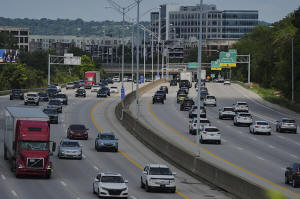Trump's EPA is targeting key vehicle pollution rules. What that means
for carmakers
[August 01, 2025] By
ALEXA ST. JOHN
DETROIT (AP) — The Environmental Protection Agency’s plan this week to
relax rules aimed at cleaning up auto tailpipe emissions is the latest
Trump administration move to undo incentives for automakers to go
electric.
As part of a larger effort to undo climate-based governmental
regulations, the EPA on Tuesday said it wants to revoke the 2009 finding
that carbon dioxide and other greenhouse gases endanger public health
and welfare. That would cripple the legal basis for limiting emissions
from things like power plants and motor vehicles.
President Donald Trump’s massive tax and spending law already targets EV
incentives, including the imminent removal of a credit that saves buyers
up to $7,500 on a new electric car.
The tax law approved in early July also includes another provision that
will hit Tesla and other EV makers in the pocketbook — repealing fines
for automakers that don’t meet federal fuel economy standards.
Automakers can buy credits under a trading program if they don’t meet
the mileage standards. EV makers like Tesla, which don’t rely on
gasoline, earn credits that they can sell to other carmakers. The
arrangement has resulted in billions of dollars in revenue for Tesla and
millions for other EV makers like Rivian.
That is all set to go away under the new law.

Trump has also challenged federal EV charging infrastructure money and
blocked California’s ban of new gas-powered vehicle sales.
It adds up to less pressure on automakers to continue evolving their
production away from gas-burning vehicles. And that's significant
because transportation — which also includes ships, trains and planes —
is the sector that contributes the most to planet-warming emissions in
the U.S.
Push and pull on tailpipe and mileage rules
Stringent tailpipe emissions and mileage rules were part of the Biden
administration's pledge to clean up the nation’s vehicles and reduce use
of fossil fuels by incentivizing growth in EVs. EVs do not use gasoline
or emit greenhouse gases.
The Trump administration and the auto industry have said both rules were
unreasonable for manufacturers.
Automakers could meet EPA tailpipe limits with about 56% of new vehicle
sales being electric by 2032 — they're currently at about 8% — along
with at least 13% plug-in hybrids or other partially electric cars, and
more efficient gasoline-powered cars that get more miles to the gallon.
The latest mileage targets set under the Biden administration required
automakers to get to an average of about 50 miles (81 kilometers) per
gallon for light-duty vehicles by model year 2031, and about 35 miles
per gallon for pickups and vans by model year 2035.
But Department of Transportation Secretary Sean Duffy pressured the
National Highway Traffic Safety Administration earlier this year to
reverse the rules, and has recently said Biden’s inclusion of EVs in
calculating them was illegal. NHTSA will likely reset or significantly
weaken them.
The fines that are going away
Then there are the fines that automakers will no longer face for falling
short on the fuel economy rules.
[to top of second column] |

Vehicles drive along a highway Wednesday, July 30, 2025, in
Cincinnati. (AP Photo/Joshua A. Bickel)

“With the signing of the One Big Beautiful Bill, new penalties for
automakers not complying with an illegal fuel economy standard designed
to push EVs will be zero,” NHTSA spokesman Sean Rushton said in a
statement.
Some legacy automakers have paid hundreds of millions of dollars in
penalties for not meeting them. Just last year, Jeep-maker Stellantis
paid $190.7 million for model years 2019 and 2020, and General Motors
paid $128.2 million for the 2016 and 2017 model years.
Automakers that didn’t meet the standards could also instead buy credits
from carmakers that did — or even surpassed them — such as Tesla. That
provision earned Tesla $2.8 billion in 2024 — revenue it will no longer
see.
Elon Musk sharply criticized the big tax-and-spending bill in June,
saying it “gives handouts to industries of the past while severely
damaging industries of the future.” Tesla did not immediately respond to
a request for comment on the law's effect on those credits.
The agency wrote to carmakers earlier this month informing them the
penalties wouldn’t be issued from the model year 2022 onward. Some
automakers confirmed receiving the letter but declined to comment
further.
Experts say without them, the law “invites automakers to cheat on
government fuel economy rules by setting fines to $0, ensuring consumers
will buy more gas guzzlers, pay more at the pump and enrich Big Oil,”
said Dan Becker, director of the Center for Biological Diversity’s Safe
Climate Transport Campaign.
Ann Carlson, an environmental law professor at the University of
California, Los Angeles, and a former acting NHTSA administrator under
Biden, called it a “stunning decision” for NHTSA to essentially forgive
the fines from 2022 onward. She said it amounted to a windfall for
companies that chose to pay penalties rather than produce more efficient
cars.
Carlson said backing away from future fines also “poses a dilemma for
auto manufacturers who may feel bound to comply with the law, even if
there is not a financial consequence for failing to do so.”

Where auto manufacturers go from here
It takes a while for carmakers to shift their product lines, and experts
say automakers might be locked into their technology and manufacturing
decisions for the next few model years. But changes could come for model
year 2027 and beyond, they said.
EVs aren't as profitable as gas-engine cars, so automakers may make
fewer of them if they no longer have to offset emissions from their
gasoline models. Already, some automakers have pulled back on their
ambitions to go all-electric with a slower pace of EV sales growth.
“Automakers also know every presidential administration eventually comes
to an end, so they won’t abandon their EV development efforts," said
Karl Brauer, executive analyst at iSeeCars.com. "But they will reduce
their near-term efforts in this area.”
All contents © copyright 2025 Associated Press. All rights reserved |